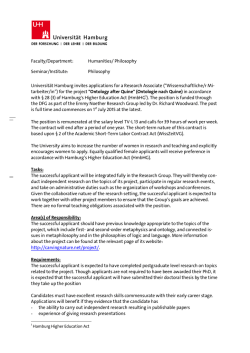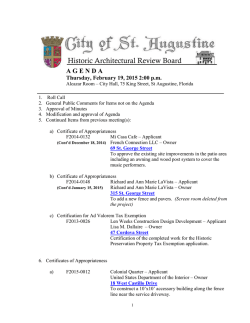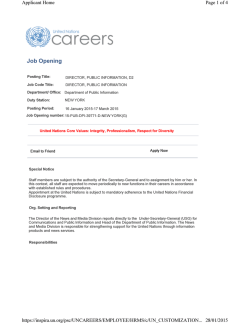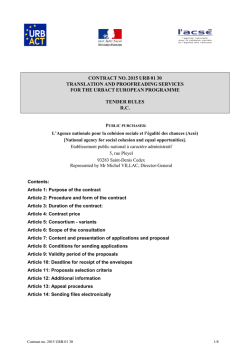
PDF format
IN THE HIGH COURT OF SOUTH AFRICA (EASTERN CAPE DIVISION, MTHATHA) CASE NO.: 533/2013 In the matter between: ALEX SAPONG First Applicant TRANSWORLD PROCUREMENT Second Applicant NANEEM AHMAD Third Applicant And MAPHELO MNZINGANE N.O. Respondent JUDGMENT BESHE, J: [1] This is an application for the rescission and setting aside an order/judgment granted against the applicant’s favour of the respondent on the 10 May 2012. The order in question is in the following terms: 1. Respondents remain in occupation of erf 2451 Mthatha up to the 30th November 2012 on which day they should vacate from the said premises. 2. Respondents pay and continue to pay rent in lieu of their occupation of erf 2451 Mthatha in an amount of R9 500-00 monthly in advance with effect from the 1 June 2012 up to 31 December 2012. 3. Present interdict and or restraining order be and is hereby confirmed. 4. Respondents be and are hereby made to pay costs of this application jointly and severally, the one paying the others to be absolved. 1 [2] The factual background to the application, briefly stated is the following: In the main application, applicant therein, sought an interdict against the respondents restraining them from demolishing the property on erf 2451 in Mthatha and from erecting unlawful structures on the property. Also sought was an order ejecting the respondents (the present applicants) from the erf in question. In the main application, applicant contends the property in question had been leased to first and second applicants in this present application and without the applicant in the main applicant’s consent and knowledge the property was sub-letted to the third respondent. That the respondents proceeded to develop the erf without the applicants’ knowledge and consent. Further that for some other reasons relating to inter alia the payment of rentals, the lease between the applicant and first and second respondents was terminated. [3] From the papers filed of record, it would appear that after reading the papers and hearing the attorney for the applicant, Nhlangulela J issued a rule nisi that was returnable on the 5 April 2012. The order was in the following terms: IT IS ORDERED 1. That the applicant’s non-compliance with the provisions of Rule 6 of the Rules of this Court be condoned and that leave be granted to the Applicant to bring this application as a matter of urgency in terms of Rule 6(12) of the Rule of Court. 2. That a rule nisi do hereby issue calling upon the respondents to show cause, if any on 5 th April 2012 at 10:00 or as soon thereafter as the matter may be heard why an order in the following terms should not be made final: 2.1 That the First, Second and Third Respondents be interdicted and restrained from demolishing or destroying buildings or structures on erf 2451 Mthatha. 2.2 That the First and Second and Third Respondents be interdicted and restrained from constructing or erecting any structure of whatever nature on erf 2451 Mthatha. 2 2.3 That the Respondents be and are hereby ejected from the premises at erf 2451 Mthatha. 2.4 All leases involving the Respondents in connection with erf 2451 be and are hereby declared unlawful and of no force or effect and cancelled. 2.5 The First, Second and Third Respondents pay the costs of this application jointly and severally, the one paying the other to be absolved. 2.6 That paragraph 2.1 and 2.2 above shall operate as an interim interdict/mandamus pending the finalization of the application. 2.7 That the Applicants be given further and or alternative relief. On the 5 April 2012 the matter was postponed to the 26 April 2012. It is noteworthy that Mr Mayekiso was in court when the order postponing the matter and placing the parties on terms regarding the filing of affidavits was issued. The matter came to serve before Bacela AJ on the 10 May 2012 where upon reading documents filed of record and hearing counsel for the applicant, she issued the order sought be rescinded in these proceedings. The order is said to have been taken by consent between the parties. [4] The basis for applying for the rescission of the abovementioned order is that it was erroneously sought on the basis that it was by consent between the parties and granted on that basis whereas in fact only third respondent has instructed an attorney, Mr Mayekiso, to represent him. Third respondent, who is the third applicant in the application for rescission appears to be denying giving his erstwhile attorney Mr Mayekiso instructions to consent to the impugned order. [5] The variation and rescission of orders is regulated in addition to Common Law and Rule 31 (2) (b) also regulated by Rule 42. Rule 42 (1) provides that: 3 “42 Variation and rescission of orders 1. The court may, in addition to any other powers it may have, mero motu or upon the application of any party affected, rescind or vary: (a) An order or judgment erroneously sought or erroneously granted in the absence of any party affected thereby; (b) an order or judgment in which there in an ambiguity, or a patent error or omission, but only to the extent of such ambiguity, error or omission; (c) an order or judgment granted as the result of a mistake common to the parties.” [6] On the 5 April 2012, Mr Mayekiso filed a notice to oppose the main application. The notice is dated the 2 April 2012 and reads thus: BE PLEASED TO TAKE NOTICE THAT respondents intend to oppose the application. (my underlining) Mr Mayekiso has deposed to an “explanatory affidavit” wherein he states that he only represented the third applicant on whose instructions he settled the matter. That he did not represent first and second applicants in this matter. (respondents in the main application) That the notice to oppose the main application inadvertently reflected that the application was opposed by the respondents instead of third respondent. [7] As to what steps first and second applicants took upon being aware of the application, first applicant states that it was agreed that third applicant should defend / oppose the matter seeing that the relief sought affected him as the person who was running a business from the premises. Third applicant, who did not depose to an affidavit but was content with confirming first applicant’s affidavit, does not take the court into his confidence to explain what steps he 4 took upon not being able to get hold of Mr Mayekiso for a whole year. This in view of fact that he was aware of a rule nisi that had been issued against him and his co-applicants. The rule was returnable on a particular date. This, especially in view of the fact that he denies that he gave Mr Mayekiso any instructions to settle the matter on his behalf. Instead he was waiting for Mr Mayekiso to phone him so that he could sign court papers which he never did. In my view it is inconceivable that in the face of a possible eviction third applicant would adopt this supine attitude. Same applies to first and second applicants. In so far as the application that was instituted against them was concerned and the consequent rule that was issued against them. It is also a mystery how the mistake regarding who Mr Mayekiso represented could have been perpetuated from the notice to oppose the matter, discussions about the order purportedly consented to by the respondents and finally when the order was issued. How is it possible that the order was agreed upon without Mr Mayekiso knowing what was contained in the order? In my view this underpins the need for us to stead fastly apply Rule 4 (d) of the Joint Rule of Practice of this court which reads as follows: “d) If an opposed action, application or appeal is settled and the parties desire that their settlement agreement be made an order of court, both parties should be present when the order is made unless one of them files a notice of withdrawal of his or her opposition. In the event of a party not appearing, documentary proof of its agreement to the order sought will have to be produced.” I have no doubt that had Mr Mayekiso been in court when the order in question was issued or if not court, had documentary proof or the agreement been produced, these proceedings would have been avoided. [8] Respondent opposes the application for a rescission not on the basis that Mr Mayekiso had instructions to represent first and second applicants. But on the 5 following grounds: That in the absence of a notice to oppose the main application by first and second applicants, the respondent was entitled to an eviction order against them. According to the founding affidavit, first and second applicants left it to third applicant to oppose the granting of the relief sought. And according to Mr Mayekiso he did not have first and second applicants’ instructions to oppose the matter. First applicant explains why the decision was made at paragraphs 10. to 14. of the founding affidavit as follows: “10. Due to the fact that I had subleased the premises to the third applicant I spoke with him about the matter and he was resolved on defending the claim on his behalf. 11. We agreed that he should defend the matter on his behalf and that I will file papers to support this defence. 12. For that reason I handed over everything to the respondent to defend the matter on his behalf and I undertook to file affidavits to support his defence. 14. The approach was sensible because the third respondent runs a hardware in the premises valuing million of rands and he was already in possession of the premises as aforesaid and trading.” In my view, the respondent has a valid point in this regard, namely that because first and second applicants did not oppose the matter, seemingly had no intention of resisting the application, respondent was entitled to an eviction order against them. [9] First applicant admits that he subleased the property to the third applicant and as indicated above it was resolved that he should defend the application. Third applicant took steps to oppose the matter by employing the services of an attorney Mr Mayekiso. As indicated earlier, it is inconceivable and improbable that Mr Mayekiso would settle the matter without instructions from the third applicant who was mandated by his co-applicants by “handing everything to 6 him to defend the matter”. According to Mr Mayekiso, he settled the matter on third applicant’s instructions. The question therefore is whether in these circumstances the order was sought and granted in error. The error alleged as I understand is that the court was made to believe that the order sought had been consented to by the parties, whereas in fact it had not been consented to by the present applicants. [10] In Colyn v Tiger Food Industries Ltd t/a Meadow Feed Mills (Cape) 2003 (6) SA 1 SCA at pages 6 to 7 it was pointed out that Rule 42 (1) (a) caters for a mistake. Rescission does not follow automatically upon proof of a mistake. At paragraph 8 of the judgment Jones AJA states that the trend of the courts over the years is not to give a more extended application to the rule to extend all kinds of mistakes or irregularities. It appears to be common cause that no opposing affidavits were filed after a notice of intention to oppose the matter was filed. The applicants or at least one of them, who had been mandated to defend the matter, was legally represented to the extent that when the matter was postponed previously his attorney was in court. In my view even if it was not represented to the court that the order was sought by consent between the parties, the rule nisi would have been confirmed by default on the part of the applicants or put differently, the applicant in the main application was entitled to an eviction order against the present applicants in the absence of opposing papers filed by them. In my view, there was no procedural irregularity or error. See Lodhi 2 Properties Investments CC and Another v Bondev Developments (Pty) Ltd 2007 (6) SA 87 SCA where it was stated that: “[25] However, a judgment to which a party is procedurally entitled cannot be considered to have been granted erroneously by reason of facts of which the Judge who granted the judgment, as he was entitled to do, was unaware, as was held to be the case by Nepgen J in Stander. See in this regard Colyn v Tiger Food Industries Ltd t/a Meadow Feed Mills (Cape) 7 2003 (6) SA 1 (SCA) ([2003] 2 All SA 113) in paras 9-10 in which an application in terms of Rule 42(1) (a) for rescission of a summary judgment granted in the absence of the defendant was refused notwithstanding the fact that it was accepted that the defendant wanted to defend the application but did not do so because the application had not been brought to the attention of his Bellville attorney. This Court held that no procedural irregularity or mistake in respect of the issue of the order had been committed and that it was not possible to conclude that the order had erroneously been sought or had erroneously been granted by the Judge who granted the order.” [11] I have already expressed my misgivings about the veracity of the allegation that third applicant did not give Mr Mayekiso instructions to settle the matter. I am therefore unable to find that the order was sought and granted by mistake. [12] Even if I were to look at the application for rescission in terms of the common law, the applicants fail on that score as well. They have not shown good cause as to why they did not oppose the application. First applicant states in so many words that a decision was taken that first and second applicants would not oppose the relief sought b let third applicant do so and states the reason for this election. [13] In the result the application is dismissed with costs. _______________ N G BESHE JUDGE OF THE HIGH COURT 8 APPEARANCES For the Applicant s : Adv. V Kunju Instructed by : MESSRS XM PETSE INC. 4th Floor, Development House York Road MTHATHA Tel.: 047 – 531 1572 / 047 – 531 0267 Ref.: Mr Vika/ns: AS0016 For the Respondent : Adv. C Bodlani Instructed by : MESSRS CHRIS BODLANI ATTORNEYS 28 Madeira Street Clublink Building MTHATHA Tel.: 047 – 532 5711 Ref.: UC/pp/CIV1566 Date Heard : 13 March 2014 Date Reserved : 13 March 2014 Date Delivered : 29 January 2015 9
© Copyright 2026





